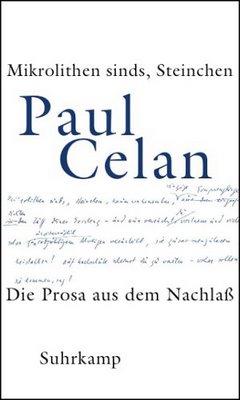Paul Celan: Microliths They Are, Pebbles
Paul Celan, Mikrolithen sinds, Steinchen — Die Prosa aus dem Nachlaß [Microliths they are, Pebbles — The Posthumous Prose], edited and with commentaries by Barbara Wiedeman and Bertrand Badiou.
Paul Celan – Peter Szondi, Briefwechsel [Correspondence], edited by Christoph König (includes letters from Gisèle Celan-Lestrange to Peter Szondi and extracts from the correspondence between Peter Szondi and Jean and Mayotte Bollack).
I have not yet had the time to read into the Szondi correspondence, but will get to it eventually. Obviously it is the prose writings that are the most welcome, as we have so little of it: two poetological essays (The Bremen Prize speech and The Meridian) and a short narrative (Conversation in the Mountains), plus a few brief occasional pieces. It was thus surprising to see that the Posthumous Prose turns out to be close to 950 pages long — and somewhat disappointing to realize that this massive volume breakse down into 217 pages of actual Celan prose and 731 pages of editorial commentary. But on perusal it quickly becomes evident that this ratio is not unwarranted: much of the Celan concists in very fragmentary bits and pieces, such as notes in the back of books, paragraphs on loose leaves, etc., and the exhaustive description of where these notes were found thus furnishes the necessary background material to contextualize these dispersed fragments.
Not surprisingly, the book opens with a range of aphoristic writings — we already knew that Celan liked that genre, from some of the writing from his time in Rumania right after WWII. It would be interesting to meditate on how this early liking of foreshortened forms returns in or mutates into the laconic tight late poems — a connection that may shed more light on the work than the simple quasi-dismissal of the late poems for a supposed “Verstummen,” “a falling silent” or becoming mute attributed to the poet’s failing mental health.
More surprising is the discovery of some 40 pages of narrative prose scenes and some notes towards a play. The book also reproduces various writings by PC concernign the Goll affair. Maybe most interesting are the theoretical fragments that will help us get a better sense of Celan’s sense of his poetics, even if we have a superb and concise version of these poetics in The Meridian essay and especially in the scholarly edition thereof which reprints all the versions, notes & contextual bits of writing that went into the Meridian (some of which are, by the way, reprinted in this volume — most usefully the section on the necessary “darkness of poetry”).
Tomorrow I’ll post a couple pages from the poetological section in translation, if the day leaves me enough leisure to do so.


 Poasis II: Selected Poems 2000-2024
Poasis II: Selected Poems 2000-2024 “Todesguge/Deathfugue”
“Todesguge/Deathfugue” “Interglacial Narrows (Poems 1915-2021)”
“Interglacial Narrows (Poems 1915-2021)” “Always the Many, Never the One: Conversations In-between, with Florent Toniello”
“Always the Many, Never the One: Conversations In-between, with Florent Toniello” “Conversations in the Pyrenees”
“Conversations in the Pyrenees” “A Voice Full of Cities: The Collected Essays of Robert Kelly.” Edited by Pierre Joris & Peter Cockelbergh
“A Voice Full of Cities: The Collected Essays of Robert Kelly.” Edited by Pierre Joris & Peter Cockelbergh “An American Suite” (Poems) —Inpatient Press
“An American Suite” (Poems) —Inpatient Press “Arabia (not so) Deserta” : Essays on Maghrebi & Mashreqi Writing & Culture
“Arabia (not so) Deserta” : Essays on Maghrebi & Mashreqi Writing & Culture “Barzakh” (Poems 2000-2012)
“Barzakh” (Poems 2000-2012) “Fox-trails, -tales & -trots”
“Fox-trails, -tales & -trots” “The Agony of I.B.” — A play. Editions PHI & TNL 2016
“The Agony of I.B.” — A play. Editions PHI & TNL 2016 “The Book of U / Le livre des cormorans”
“The Book of U / Le livre des cormorans” “Memory Rose Into Threshold Speech: The Collected Earlier Poetry of Paul Celan”
“Memory Rose Into Threshold Speech: The Collected Earlier Poetry of Paul Celan” “Paul Celan, Microliths They Are, Little Stones”
“Paul Celan, Microliths They Are, Little Stones” “Paul Celan: Breathturn into Timestead-The Collected Later Poetry.” Translated & with commentary by Pierre Joris. Farrar, Straus & Giroux
“Paul Celan: Breathturn into Timestead-The Collected Later Poetry.” Translated & with commentary by Pierre Joris. Farrar, Straus & Giroux